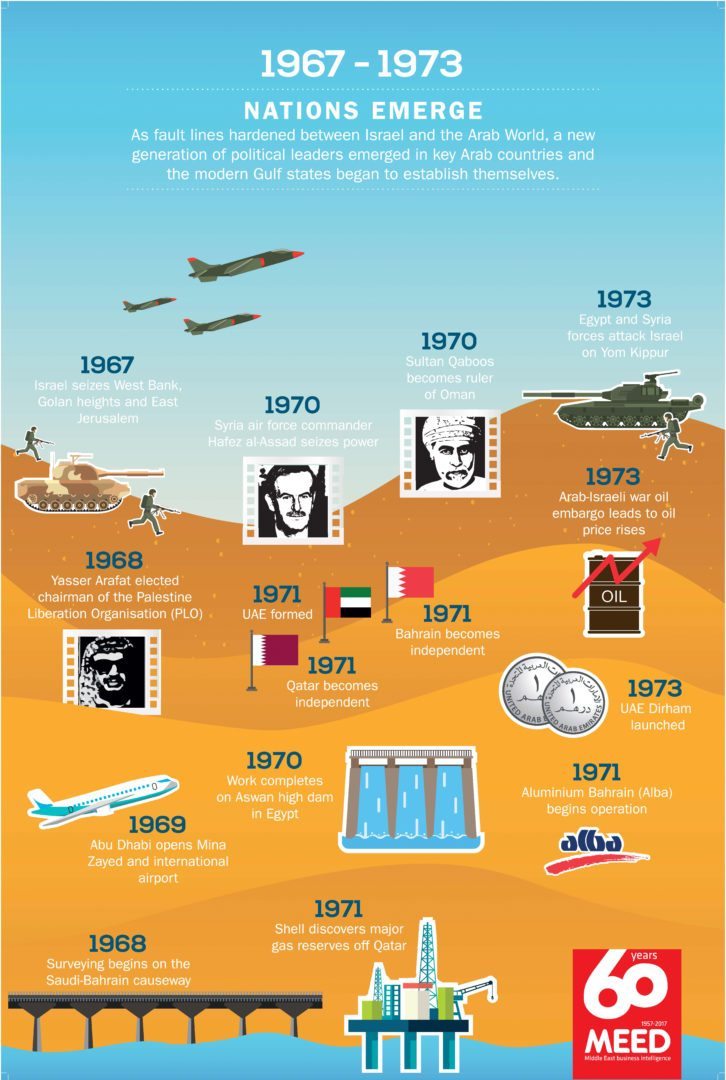

As fault lines hardened between Israel and the Arab world, a new generation of political leaders emerged in key Arab countries and the modern Gulf states began to establish themselves

MEED 1967-1973 infographic
MEED 1967-1973 infographic
As MEED entered its second decade, the optimism of the previous 10 years came to an abrupt end following Israels victory in the Six-Day War, which saw it seize the Sinai, the West Bank, the Golan Heights and East Jerusalem.
The conflict created hundreds of thousands of Palestinian refugees and shattered the credibility of the Arab governments associated with the disaster. The countries of the Arab world resolved to resist Israel and recover the land it had occupied, and those favouring more radical policies moved to centre stage.
One year after the war, Yasser Arafat was elected chairman of the Palestine Liberation Organisation, with a mandate to put Palestine at the top of the Middle East agenda.
This period saw a new generation of political leaders emerge. In Egypt, Anwar Sadat took over as president from Gamal Abdel Nasser. In Iraq, the Baath Party took power, bringing to prominence Saddam Hussein. One year later in 1969, a 28-year-old Colonel Muammar Qaddafi seized power in Libya, while in Syria, Hafez al-Assad was made president.
This period also saw the modern Gulf states begin to establish themselves. Sultan Qaboos displaced his father in July 1970 and started Omans modernisation drive. In 1971, Bahrain, Qatar and the UAE were created as independent states following the UKs decision in 1968 to withdraw its armed forces east of Suez.
7 Feb 1958
Formation of the United Arab Republic linking Egypt and Syria
2 Feb 1967
Sonatrach buys out BPs distribution network in Algeria
11 Feb 1979
Iran becomes Islamic Republic after Ayatollah Khomeini returns
4 Feb 1983
Kuwait Petroleum Company acquires the US Gulf Oil Corporations European downstream operations
15 Feb 1991
US-led coalition increases bombing raids as it seeks to eject Iraqi forces from Kuwait
2 Feb 2007
Dubai plans new real estate brokerage law as report warns property prices could slump 15 per cent due to oversupply
Major industrialisation plans were devised for the first time in the region. Aluminium Bahrain was established, Saudi Arabia launched its first five-year development plan, and Iran reached an agreement with Japan to build a huge petrochemicals plant.
In the early 1970s, taking greater control of oil became a priority, with pressure mounting for a higher oil price to help finance development programmes. In 1972, Iraq nationalised its oil industry, triggering a wave of nationalisations across the region.
The issue came to a head in 1973, with the October War, in which Egypt and Syria attacked Israel. The war ended in a stalemate, but resulted in a coordinated oil embargo by Arab states against countries supporting Israel.
In October 1973, a large oil price hike was agreed by Opec, challenging the foundations of the world order.
You might also like...

Global AI market to top $1tn in 2030
25 April 2024

Morocco tenders Noor Midelt 2
25 April 2024

Saudi Arabia's Roshn launches Aldanah Dhahran project
25 April 2024

Kuwait retenders revegetation contracts
25 April 2024
A MEED Subscription...
Subscribe or upgrade your current MEED.com package to support your strategic planning with the MENA region’s best source of business information. Proceed to our online shop below to find out more about the features in each package.








